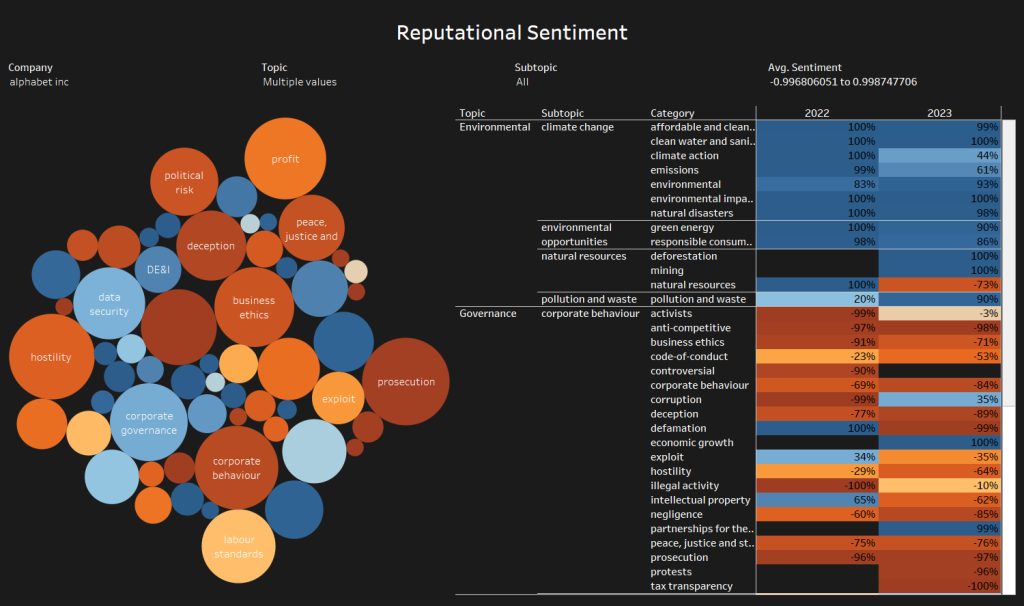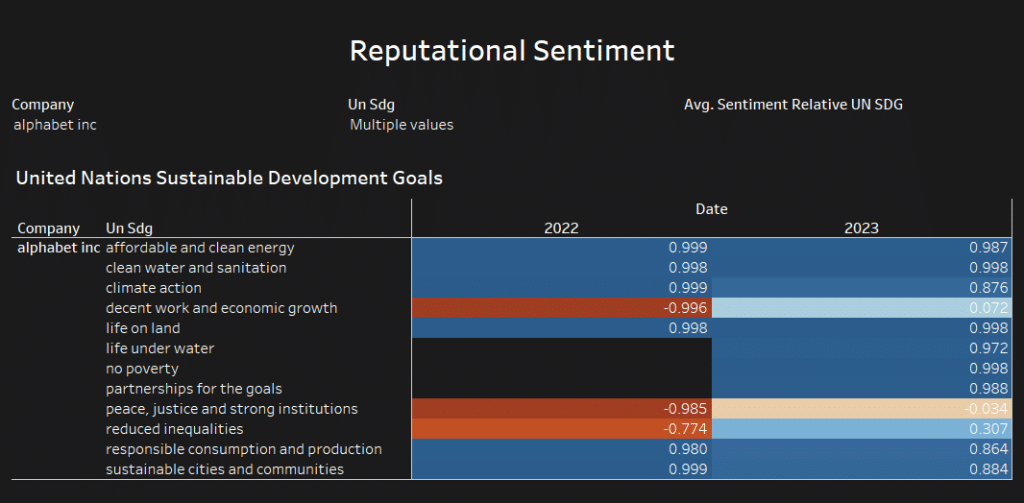As the tech industry continues to face scrutiny regarding its environmental impact and corporate responsibility, the Alphabet/Google ESG rating has emerged as a crucial metric in assessing the sustainability efforts of the company. With the increasing demand for companies to prioritize ESG factors, Alphabet/Google’s commitment to their environmental commitments becomes central in empowering sustainable change within the industry.
The importance of ESG ratings in the tech industry
In recent years, there has been a growing recognition of the need for companies to consider their impact on the environment, society, and governance. ESG ratings have become an essential tool for investors, customers, and other stakeholders to evaluate a company’s sustainability practices and ethical standards. In the tech industry, where innovation often outpaces regulation, ESG ratings play a critical role in holding companies accountable.
Tech companies, with their significant energy consumption, e-waste generation, and potential for social impact, have faced increasing scrutiny from both the public and regulators. As a result, investors and customers are demanding more transparency and accountability from these companies. ESG ratings provide a standardized framework for assessing a company’s performance across environmental, social, and governance factors, allowing stakeholders to make informed decisions and drive change.
Alphabet/Google ESG rating and its impact
Alphabet/Google, as one of the largest and most influential tech companies in the world, has a substantial impact on the industry’s overall sustainability.

Environmental
Through their robust ESG commitments, Alphabet/Google showcases their dedication to minimizing their environmental impacts. According to our data, Google scores high on environmental scores (90). This is due to several commendable initiatives and commitments aimed at reducing its environmental footprint. These include a substantial investment in renewable energy sources to power its data centers and operations, with a pledge to operate on 100% carbon-free energy by 2030.
Google has also made significant contributions to renewable energy projects worldwide. Additionally, the company is focused on achieving zero waste in its data centers and campuses, actively working towards sustainable sourcing and circular economy practices. Google’s transparency in reporting its environmental impact and its active involvement in climate advocacy and policy further contribute to its positive environmental scores. These efforts reflect Google’s commitment to sustainability and responsible environmental practices, earning it high marks in this crucial area.
Social
In terms of social impact, Google/Alphabet also has plenty of room for improvement (46). Google’s mediocre social score can be attributed to several factors that have raised concerns and criticisms in the realm of social responsibility. One significant issue is the handling of user data privacy, which has led to controversies and privacy breaches, eroding trust among users.
Additionally, Google has faced accusations of bias in its search algorithms and content recommendations, which can perpetuate stereotypes and contribute to social division. The company has also grappled with challenges related to content moderation on platforms like YouTube, where harmful or inappropriate content sometimes goes unchecked, impacting the online community’s well-being.
Internal disputes and employee protests over matters such as sexual harassment allegations and involvement in contentious government contracts have highlighted concerns about Google’s ethical governance (more on that below). Addressing these issues and demonstrating a stronger commitment to social responsibility will be crucial for Google to improve its social score and enhance its reputation in this domain.
Governance
The company’s low governance score (16) stems from a multitude of challenges, including data privacy breaches, antitrust investigations, algorithmic bias, content moderation difficulties, internal employee protests, environmental concerns, perceived political influence, and transparency shortcomings. These issues have raised significant doubts about the company’s commitment to ethical and responsible business practices, highlighting the need for Google to address these concerns and rebuild trust across these governance-related domain.


Comparison of Alphabet/Google ESG rating with competitors
When comparing Alphabet/Google’s ESG rating with its competitors, it becomes evident that Google is at the forefront of sustainability and ethical practices within the tech industry. Google consistently receives high ESG ratings, reflecting its commitment to addressing key environmental and social challenges while maintaining strong governance practices.
While other tech companies have also made efforts to improve their ESG performance, Google’s comprehensive approach sets it apart. The company’s investments in renewable energy, commitment to diversity and inclusion, and robust governance practices demonstrate a holistic approach to sustainability and responsible business practices.
However, it is important to note that ESG ratings can vary depending on the methodology and criteria used by different rating agencies. Therefore, while Alphabet/Google may receive high ratings from some agencies, it may receive lower ratings from others. It is essential to consider multiple perspectives and evaluate a company’s performance across various ESG factors.
Our ESG data for Alphabet/Google’s competitors can be found below:
Challenges and criticisms surrounding Alphabet/Google ESG rating
Challenges and criticisms surrounding Alphabet/Google’s ESG rating underscore the complex landscape of sustainability and ethical responsibility in the tech giant’s operations. Despite Alphabet/Google’s proclaimed dedication to sustainability and ethical practices, several noteworthy concerns have arisen, warranting closer examination.
A prevalent criticism revolves around the perceived dissonance between Google’s professed values and its real-world actions. While the company has made public commitments to environmental stewardship, social responsibility, and ethical business conduct, some critics argue that certain business practices appear incongruent with these lofty aspirations. Notably, concerns emerge regarding Google’s vast data collection and its implications for user privacy.
One of the central issues contributing to the criticism is the sheer scale of data amassed by the company. Google’s extensive data collection, integral to its core services such as search, advertising, and mapping, has raised concerns about user privacy and data security. Critics contend that this vast reservoir of user data, if not handled responsibly, could compromise individuals’ privacy rights and potentially undermine the company’s professed commitment to ethical data use.
Furthermore, the criticism extends to questions about how Google harnesses this data for advertising purposes. Critics argue that while Google may emphasise user consent and data protection, the company’s advertising practices could inadvertently contribute to privacy concerns, challenging its alignment with the principles of social responsibility.
Additionally, the balance between Google’s pursuit of innovation and the potential societal impact of its technologies remains a subject of scrutiny. Concerns have been raised about how certain technological advancements, such as artificial intelligence and machine learning, are developed and implemented in ways that may not always align with broader ethical and social considerations.
Alphabet/Google ESG rating: Final thoughts
In conclusion, as the tech industry grapples with increased scrutiny regarding its environmental impact and corporate responsibility, the Alphabet/Google ESG rating has emerged as an indispensable yardstick for assessing the company’s sustainability endeavours. In an era where stakeholders are placing greater emphasis on ESG factors, Alphabet/Google’s unwavering commitment to environmental responsibility takes on a central role in driving sustainable change within the tech industry.
ESG ratings have become vital instruments for investors, customers, and other interested parties, offering a structured framework to gauge a company’s commitment to sustainability and ethical standards. Within the tech sector, where rapid innovation often outpaces regulation, ESG ratings serve as a crucial mechanism to hold companies accountable.
Tech companies, given their significant energy consumption, electronic waste generation, and potential for societal influence, have come under heightened scrutiny from both the public and regulators. Consequently, there is a growing demand for transparency and accountability from these industry giants. ESG ratings provide a common language for evaluating a company’s performance across environmental, social, and governance dimensions, empowering stakeholders to make informed decisions that drive meaningful change.
Find out more
Join us in our pursuit of a deeper understanding of Alphabet/Google’s ESG practices. To uncover the full scope of their impact on sustainability and change in the tech industry, we invite you to request more granular data from Permutable. Get in touch to access the detailed insights you need below.
